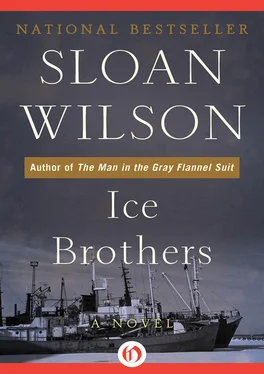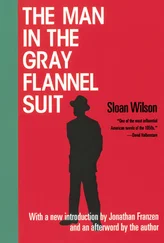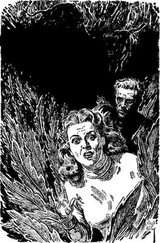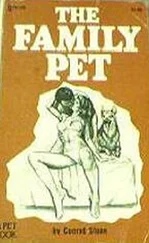Two days later the Nanmak left the yard for Norfolk, Virginia, where she was to be fitted with special equipment before sailing north. A week after that the Arluk got orders to start for Greenland the following Thursday, April 30. Paul was so involved in the frantic last-minute preparations, and Mowrey continued to discipline him so severely that he got only one night ashore to see his wife, a fact which made Chris shake his head in dismayed disbelief.
That one last night with Sylvia under the eaves of the old colonial house was wonderful, of course, and also so troubling in many ways that Paul simply could not allow himself to think of it now. He was so tired and so keyed up when he came to Sylvia that their love-making was nothing like the fantasies both of them had had. She too was tense and full of a strange sense of failure. The truth was that they spent part of their last night crying in each other’s arms like heartbroken children, but there had been more to it than that, and Paul simply could not allow himself to dwell on this joyful, painful meeting and parting at a time when his head was full of dozens of lists of things he had to do immediately to get the ship ready to sail. As he told Sylvia when he kissed her good-by, the only thing they should remember was that they loved each other and that there certainly was no doubt about that. If a night of passion at a time of crisis was not always what it was cracked up to be, that was nobody’s fault at all, he told himself, but he was afraid to say that to her. Instead he told her that he loved her so many times that it began to sound ridiculous and added that she was the most beautiful girl in the world and was getting prettier all the time. Just before he left she said, “Paul — I guess I should ask you for the registration of the car. I never get stopped, but you can’t tell.”
He took the paper from his wallet and handed it to her. “Be careful,” he said. “Be careful! Take care of yourself.” Then he ran.
CHAPTER 10
The Arluk sailed from the shipyard at seven in the morning. It was a rainy, windy day, cold for spring, but nowhere near as cold as it soon was going to be, Paul reminded himself as he buttoned his parka under his throat. The departure from the wharf was as undramatic as it could possibly be. Two bored yard workers cast off their lines and hurried back into the warmth of the sheds without a wave or a backward glance. Mowrey gave three short blasts of the ship’s surprisingly high, unauthoritative air whistle as he backed into the harbor. The seamen who were not on watch hurried below to get coffee as soon as they had stowed the lines.
While Mowrey conned the ship, Paul stood on the starboard wing of the bridge watching the familiar coastline and islands of Boston harbor slip by. How many times had he sailed out of this harbor aboard the Valkyrie? It occurred to him that this voyage might end disastrously for him and that he might never see Boston or the U.S. again. This thought seemed absurdly melodramatic and he dismissed it.
“Yale, tell Cookie to bring me a cup of coffee,” Mowrey said.
Paul relayed the message to the forecastle by telephone. When Cookie appeared with the coffee, Mowrey ducked into his cabin and shut the door. When he reappeared a moment later, the smell of whiskey rose from the coffee cup, almost as visible as the steam.
The bay was relatively calm, but soon after they left the lightship, they encountered big swells rolling in on their starboard beam from the broad Atlantic and the trawler began to roll. First a pair of binoculars slipped from a shelf in the bridge where Paul had carelessly left them.
“Don’t you know that ships roll, Yale?” Mowrey asked.
Next Mowrey noticed that some big reels of cable which were part of their deck cargo had not been lashed in place securely enough and were starting to move.
“Get Farmer and secure that damn stuff before it carries away,” Mowrey said. “What’s the matter with you people? Can’t you do anything right the first time?”
By the time the reels of cable were secured, the ship was rolling with greater violence than the old Valkyrie , with her deep keel and sails, had ever rolled. Cookie suddenly appeared in the forecastle door and shouted, “Mr. Schuman, everything’s going crazy down here!”
Everything was. A dozen young seamen lay moaning in their bunks and one had vomited all over the deck. Cookie had never been to sea, and had had no idea of how to stow the galley. Paul realized that he should have foreseen this. Now pots, pans, broken dishes and open cannisters of flour, sugar and rice pursued each other back and forth across the galley deck. Astonishingly, Cookie was not in the least seasick. He was just furious.
“Get me some men to clean this up!” he shouted to Paul. “Such a mess is no job for a chef!”
Paul appointed three men who didn’t look too seasick to the cleaning detail. Trying to help with the drums of wire cable had left his hands cold and he hurried aft to the wardroom to get gloves. Green was sitting on the edge of his bunk vomiting into a bucket. Books and boxes of writing paper which disgorged their contents were sliding back and forth on the cabin sole. The smell of sickness was strong.
“Where did you get the bucket?” Paul gasped and before Green could answer, dashed for the head. He had never been seasick aboard the old yawl, but he felt as though the convulsions of his stomach would never stop now. Seeing a bucket behind the head, he grabbed it and staggered toward his bunk. The wardroom telephone rang before he could sit down.
“Yale, is that you? Come up to the bridge! I didn’t tell you to lay below, did I?”
Carrying the bucket with the handle hooked around his arm, Paul walked toward the bridge. As he climbed up the steps to it, he had to pause, clutch the railing as the ship gave a particularly vicious roll, and retch into the bucket again.
“What have you got that bucket for, Yale?” Mowrey asked pleasantly as Paul entered the pilothouse. He was holding his cup of whiskied coffee in one hand and a cigar in the other. The tobacco smoke, the fumes of booze and the odor from another bucket in which the helmsman had been sick were overpowering. Paul retched into his bucket again.
“I don’t mind anybody being seasick as long as he don’t miss any duty,” Mowrey said with a great show of tolerance. “By the time you get to Greenland, you’ll either be over it or near to dying. Some go one way, some the other.”
Sipping from his cup, he smacked his lips and took a puff from his cigar. “The best cure for seasickness, I find, is a glass of warm gin with a cunt hair in it. Too bad we don’t have the ingredients handy.”
Both the helmsman and Paul retched into their buckets simultaneously. Glancing toward the sky, Mowrey cleared his throat and sang, “Roll, baby, roll, roll, baby, roll. You never can roll too much for me.”
“Did you ever hear that song?” he asked Paul.
“No.”
“They used to sing that on the vessels when I was a kid. Man, do you realize that Greenland is right up there over our bows? If the weather holds we’ll be there in a couple of weeks. I can just smell them Eskie girls now.” Looking up, he began to sing again: “Them Eskie girls don’t take no baths and they wash their hair in piss, but they have a way of loving that no man ought to miss.”
“Did you ever hear that song?” he asked Paul.
“No!” Paul said and retched into his bucket again.
“They used to sing it on the vessels when I was a kid. Man how I used to love to go to Greenland when I was a young feller like you. I could do it justice then. Man, I remember the first Eskie girl I ever had. She’d never seen a white man and she was so de lighted with what I had that she called her mother in to see it, and damned if she didn’t call her mother. The daughter, the mother and the grandmother all just had to try me.”
Читать дальше












